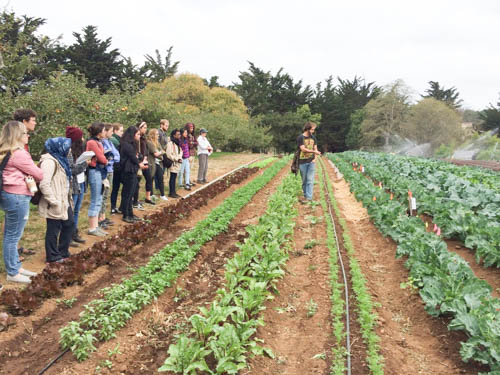Campus News
Disrupting harmful food systems to prevent future pandemics
Assistant Professor of Environmental Studies Maywa Montenegro de Wit is exploring how lessons from the abolition movement could help agroecology combat the agro-industrial complex to prevent future pandemics.

Assistant Professor of Environmental Studies Maywa Montenegro de Wit joined the UC Santa Cruz faculty this past July, amidst the global coronavirus pandemic, and that experience has guided her work in some important new directions.
Montenegro de Wit’s research focuses on the intersection of agroecology, food sovereignty, and biotechnology. But this past year, she undertook a new project to document the role of the food system in the pandemic and explore how lessons from the abolition movement could position agroecology to bring about transformative change.
“We’ve all lived through an extraordinary set of circumstances in the last year: the COVID-19 pandemic, racial upheaval, and the broad recognition of systematic violence against Black Americans, people of color, and the poor,” Montenegro de Wit said. “It became apparent to me that there were a lot of intersections between the abolition movement and social movements for agroecology and food sovereignty, and it inspired me to try and put these pieces together.”
Her findings are now published in The Journal of Peasant Studies. The paper kicks off with a literature review exposing the underlying factors in our food system that have fueled the coronavirus pandemic and other dangerous diseases, like swine flu, avian influenza, and Ebola.
For example, habitat encroachment from industrial agriculture removes natural buffer zones that traditionally prevented spillover of pathogens from wildlife. Meanwhile, dense concentrations of animals in unsanitary conditions at factories and feedlots allow disease to spread rapidly. And replacing habitats with vast crop monocultures reduces biological diversity toward a similar end.
At the same time, concentration of power in the current food system—through oligopolies and vertical integration—makes supply chains vulnerable and allows corporations to exploit workers. Both phenomena have been on display during the coronavirus pandemic, and communities of color are most likely to be affected by resulting food insecurity or unsafe working conditions.
For all of these reasons, Montenegro de Wit says it’s time for a dramatically different approach to food systems. And the coronavirus pandemic should be a global wake-up call.
“I hope there’s awareness that COVID-19 is not going to be the last pandemic we face; it’s going to be one of many,” she said. “We must completely change the paradigm of food production, not just in the US, but around the world, in order to contain the emergence of future pandemics.”

UC Santa Cruz teaches alternative food production practices through the Center
for Agroecology and Sustainable Food Systems. Students in Professor
Emeritus Deborah Letourneau’s class learned amidst a polyculture
of lettuce, basil, beets, carrot, broccoli, and apple trees. Photo: Damian Parr, 2018
Agroecology could offer solutions. Practices like polyculture and intercropping could increase the variety of crops produced, and animals could be raised on the land in ecologically beneficial ways, instead of through overcrowded, polluting factories. Agroecology strategies promote biological diversity, which makes it harder for a pathogen to spread through any one host population.
But promoting these types of alternative food production practices will require taking on entrenched systems of power. So Montenegro de Wit looked to racial justice and abolition movements for parallels from the fight against the prison-industrial complex.
“Agroecology is going to struggle to gain traction and scale out to become the dominant way of growing food and feeding people unless we’re also serious about abolishing the agro-industrial complex,” she said. “The agro-industrial complex has to go, or it’s not going to be possible to nurture an alternative.”
One important lesson that Montenegro de Wit says agroecologists should learn from abolitionists is recognizing the difference between steps toward real structural change and mere adjustments that uphold the status quo. She says the agroecology movement should focus on defining “non-negotiables” around what needs to change in our food system, and one of these demands must be justice for people of color.
Montenegro de Wit says there are still gaps in agroecology around explicitly acknowledging the role of racism in capitalist food systems, but that is changing, and she hopes to be part of that change through her work. Agroecologists are increasingly building relationships with communities of color and grassroots food and farm justice organizations, and Montenegro de Wit’s most recent work has focused on how researchers can engage community partners with accountability, reciprocity, humility, and solidarity.
“In bringing people together and joining communities that often are siloed across urban and rural boundaries, we can actually recognize that they have shared commitments and shared ideas about building a better world,” she said. “That’s so exciting to me. It’s that kind of thing that I want to carry forward, and it definitely is going to affect my future work.”